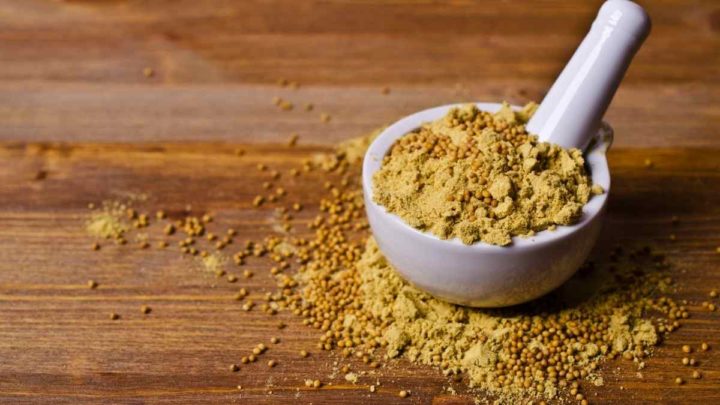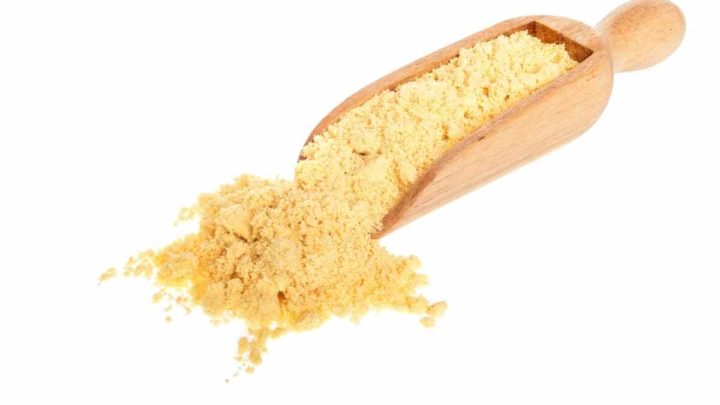Best Mustard Powder Substitutes

Best Mustard Powder Substitutes – Alternatives to Mustard Powder
Arugula is one of the best substitutes for Mustard Powder.
In the kitchen, mustard powder is a must-have. It adds taste and color to foods, but if you’re not cautious, it may trigger skin allergies. Also, because of its popularity, most supermarket shops are usually out of stock. Fortunately, there are a variety of alternatives that provide all of the same delicious tastes without the negative side effects! Here are some of the greatest mustard powder alternatives that can be used in practically any recipe.
Other Substitutions you may be interested in are
- Substitutes for Quinoa Flakes
- Substitutes for Egg Noodles
- Stewed Tomato Substitutes
- What is the best Jalapeno Substitute
- Black Onion Seed Alternatives
Arugula (arugula)
Arugula is a popular mustard powder replacement. The leaves give them a peppery bite and just enough spice to keep things interesting. They also look great sprinkled on top of salads. Because they both contain equal quantities of salt, arugula may be used instead of mustard powder. Arugula, on the other hand, contains more moisture than most other mustards, thus it won’t leave as much residue after cooking. Spills are simpler to clean up as a result of this.
When using arugula instead of dried mustard powder, the leaves must be thoroughly chopped. Then, once wilted, combine 1/4 cup chopped arugula with 2 cups boiling water. Allow at least 3 minutes for the solids to settle before straining. In salad dressings, sauces, soups, and other dishes use this liquid instead of ordinary mustard. It may not be yellow in appearance, but it has the nicest texture and taste!
Mustard Styles
For those looking for something new, prepared mustard is another great option. Dijon mustard, honey mustard, spicy brown mustard, sweet & hot mustard, barbeque sauce, and more types are available. These items are normally pre-mixed and ready to use. Garlic, onion, pepper, celery seed, chili flakes, and other spices are used in certain recipes. All of these elements combine to make a delectable product.
You just need 1 tablespoon of prepared mustard for every 1 teaspoon of mustard powder when replacing. This is due to the fact that prepared mustard is very concentrated and may be excessive for the meal.

Mustard Seed
Brown mustard seeds are another option for those seeking a mustard powder substitute. Mustard seeds, like mustard powder, originate from many species of mustard plants and have a tangy flavor and vivid yellow hue. They do, however, need some additional planning time.
To begin, soak 4 teaspoons of whole mustard seeds in 3 cups of warm water overnight. Drain the soaking fluid and rinse the seeds under cold running water in the morning. By blotting the seeds between paper towels, they will be completely dry.
Once the seeds have dried, pound them using a mortar and pestle or a coffee grinder. Keep ground mustard seeds away from light in an airtight container. Simply measure out the amount of dried mustard seed you’d typically use in a recipe and replace it with equal parts ground mustard powder.
Mustard can also be used in garam masala replacement.
Powdered Wasabi
Wasabi powder is manufactured from the root of the wasabi plant, which gives it its distinct strong taste. It is available in two forms: paste and powder. Both variants have a powerful kick of spice that pairs well with Asian cuisine, particularly sushi, sashimi, and dipping sauces. It is safe for those with food sensitivities since it does not include MSG.
When substituting wasabi powder for mustard, just use half a teaspoon for every 1 tablespoon of mustard powder. Add an additional half teaspoon of wasabi to your favorite dishes if you want them to be spicier.
Turmeric Powder
Turmeric has been utilized for medical reasons since ancient times. Turmeric powder is still used in a variety of recipes today, particularly in Asian cuisine. If you don’t have ordinary mustard powder on hand, just utilize the most typical turmeric preparation method. Roast it first to allow all of the volatile oils to escape. Turmeric gets incredibly aromatic and tasty after roasting. Using a food processor, grind them all together. Make sure they’re finely ground until there are no lumps or huge bits remaining. Roasted turmeric powder is also available at specialist shops. If you can’t locate any, then purchase normal turmeric powder and follow the methods outlined above.
It’s a great alternative to a dry mustard powder since it has a similar flavor profile to dry mustard powder without being overpowering. The nice aspect about this substitute is that you may use it as much as you like. Just keep in mind that for every 1/4 tsp of mustard powder, start with 1/2 teaspoon turmeric powder. Then, depending on your preferences, progressively increase the quantity.
Horseradish Powder
Horseradish powder is one of those spices that everyone enjoys, but few are aware of what makes it so unique. Horseradish grows well in Europe, which is where this spice comes from. Its roots grow underground and are gathered before being peeled and chopped into little cubes and dried. Dried horseradish is normally marketed as a powder and preserved in jars. While horseradish powder lacks the sharpness of fresh horseradish, it gives a great kick to soups, stews, salads, and sandwiches, among other dishes.
Combine 2 teaspoons of horseradish powder and 1/3 cup white vinegar to make a superb mustard powder alternative. Allow it to settle for 5 minutes before seasoning to taste with salt and pepper. When the mustard powder isn’t available, use this combination instead.

Mustard Dijon (French Mustard)
French mustard is another name for Dijon mustard. It’s not made the same way as mustards made in the United States. French mustards are aged longer and blended with wine vinegar rather than being boiled down. As a consequence, their color darkens yet their taste remains the same. Dijon mustard comes in three flavors: grainy, smooth, and honey. The term “American” style mustard refers to grainy mustard. When opposed to grainy mustard, smooth mustard is gentler and sweeter.
Because its taste profile is similar to that of mustard powder, most people choose Dijon mustard as a suitable alternative for normal yellow mustard powder. Some people, on the other hand, may prefer smooth mustard’s sweetness over grainy mustard’s harsh taste. Simply blend equal portions of grainy and smooth mustard powders to solve this issue. 3 teaspoons grainy mustard + 6 tablespoons smooth mustard, for example, equals 9 tablespoons total. Before keeping these two varieties of mustard in an airtight container, fully combine them.
Caraway Seeds
Caraway seeds are harvested from the carvi plant, which is a member of the carrot family. They are native to Central Asia, and the Romans were the first to grow them. Caraway is derived from the Latin word ‘caro,’ which means ‘to love.’ These small black seeds provide a distinct flavor to a variety of meals. It’s also one of the most convenient substitutions for mustard powder.
Simply use the same quantity as normal mustard when replacing. It has no effect on the food’s overall taste. However, if you want it to be hotter, you may do so by adding chile or cumin.
Mustard, stone ground
Since ancient times, stoneground mustard has been utilized. During the time of Ramses II, it was first found in Egypt. Due to its higher quality, stone grinding has grown in popularity among chefs since then. Stone ground mustard, unlike other types of mustard, includes just entire grains. As a result, it maintains all of the seed’s nutrients, including protein, fiber, minerals, vitamins, and antioxidants. It has a nutty taste to it with no bitterness at all.
This alternative works well in salad dressings and marinades since it doesn’t have a strong taste. Simply use the same quantity of mustard sauce or powder as you would for a mustard sauce or powder.
Mustard with whole grains
Brown or red wheat berries may be used to make whole grain mustard. The distinction between the two comes down to how they’re handled once they’ve been harvested. Red wheat berries lack bran and germ, while brown wheat berries do. It’s one of the greatest dry mustard alternatives since it has a taste that’s comparable to Dijon, particularly when used with meats and salads.
If you wish to use this as a replacement for mustard powder, just follow the 1:1 ratio. Even so, you’ll end up with the ideal outcomes. If you want to take it a step further, consider adding garlic, ginger, turmeric, and other spices.
Is it possible to use English mustard instead of mustard powder?
Yes. Simply replace 1 teaspoon of ground mustard with 1 tablespoon of English mustard.
What is the process for making mustard powder?
Although you may purchase mustard powder ready-made online, we suggest preparing your own. Simply roast the dry mustard seeds in a pan for at least 15 seconds. Allow to dry completely before transferring to a food processor or spice grinder. Grind until the mixture is pulverized. Use a strainer to achieve a smooth texture.
Is it possible to use mustard powder instead of mustard?
No. Both mustards are unique products with diverse applications. Rather than using mustard powder in sauces and spice blends, the mustard paste is frequently used on salads and sandwiches. If you wish to use mustard paste instead of mustard powder, you’ll need to find another product.
Is ground mustard the same as English mustard powder?
English mustard powder is made from the same sort of mustard seed which has been refined in a different way.
Is there a difference between white and yellow mustard?
Yellow mustard is manufactured from mature seeds, whereas white mustard is made from immature mustard seeds. Yellow mustard is stronger than white mustard. Yellow mustard is more potent and gives meals a tangy flavor.
Ground Mustard vs Mustard Powder
Ground mustard is used for many different purposes. It can be used as a spice, salad dressing, condiment, or even health benefits. However, ground mustard has some drawbacks. For example, it can stain clothing and cause skin irritation.
So, how do you use ground mustard?
You can easily prepare ground mustard by simply mixing it into a dish. You’ll get a similar outcome whether you use ground mustard or mustard powder.
How does mustard powder differ from mustard paste?
Mustard powder is made from crushed mustard seeds. This makes it easy to add to dishes. On the other hand, the mustard paste is prepared from the entire mustard seed. It contains both the hulls and the flesh. Therefore, it requires additional steps to remove the hulls.
The answer is mustard powder.
